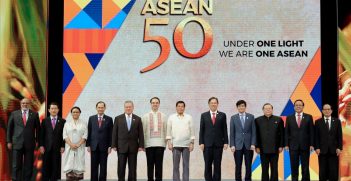Australia's Path Through Trump's Policy Labyrinth

Since he launched his presidential bid more than 18 months ago, Donald Trump has confounded prediction and eluded persuasive analysis. On Saturday morning (4am AEST), at the age of 70, he takes the office so many people thought he never could reach. He was, the conventional wisdom insisted, too crude, too rude, too lewd and too much of a buffoon to be taken seriously for high office.
But here he is, assuming the 45th presidency of the United States, his critics still at a loss as to how to assess and even properly understand the core governing philosophy of this former reality television star and real estate magnate.
Take his foreign policy views.
Trump says US military interventions in the Middle East all too often make a bad situation worse. But he also wants to destroy Islamic State, which presumably implies some sort of US military role in the Arab world.
He rails against Iran, its nuclear ambitions and its attempts to create a Shia crescent in the Persian Gulf. Yet he supports the Russian-backed campaign to embolden the Assad regime that is in cahoots with the Mullahs, who are funding the Shia militias against Sunni jihadists in Iraq.
He has questioned whether Washington should provide security guarantees to Japan and South Korea. Yet he has walked back his criticisms of Asian treaty allies in recent months and suggested he might enhance US diplomatic and security ties with Taiwan that Beijing considers part of China.
Such contradictions aside, a few things are clear about Trump’s world view, and they are strikingly at odds with that of the US foreign policy establishment. Here are four of them:
First, unlike most of his post-war predecessors and perhaps even his senior cabinet officials, Trump does not embrace the notion of American global leadership, AKA a ‘Pax Americana’. For the incoming president, trying to dominate the world and push democracy on other nations has been a disaster, especially in the Middle East.
Although his message of “America First” upsets foreign policy elites, who have dominated public discourse in Washington since the collapse of Soviet Communism, it has resonated with a war-weary public. Remember he won the November 8 election in part because he bucked both major parties on this issue. He opposed costly, bloody and pointless wars in the Middle East while he called for a new understanding with the Russians.
Second, Trump is no foreign policy idealist. Unlike most presidents since Woodrow Wilson, he does not talk the language of exceptionalism, the belief that America has a special mission to redeem the world. Although he is unlikely to be aware of AJP Taylor, given his previous criticisms of both Democrat and Republican foreign policy, Trump would no doubt subscribe to the British historian’s adage that the road to hell is paved with good intentions.
For example, in Iraq, the Bush administration’s toppling of the brutal Saddam Hussein regime cost blood, treasure and credibility, destroyed the regional balance of power and helped create the Sunni jihadists that later morphed into Islamic State. In Libya, the Obama administration helped bring down the horrific Gaddafi regime, which produced a failed state and a wonderland for jihadists. Given all this, a policy of restraint and discrimination is sensible. The flip-side, though, is that Trump is unlikely to place a premium on values and multilateralism in his foreign policy deliberations.
Third, Trump wants to go to considerable lengths to improve relations with Russia. Indeed, he is so deeply committed to ending the new Cold War that détente will be one of his first priorities. But he faces hostile opposition to any rapprochement from Democrats and Republicans as well as military and intelligence figures. Even Trump’s nominees for Defense and the CIA sounded hawkish in their recent confirmation hearings.
Democrats are using an intelligence report into hacking to blame Vladimir Putin for Trump’s victory last November. Other anti-Russian pundits and politicians are using a dodgy dossier that implies Trump is a Kremlin stooge—or at least the controversy surrounding its recent media release—to undermine his Russian policy and potentially his presidency.
Fourth, Trump opposes various free trade agreements, including NAFTA and the TPP. Again, it’s difficult to deny his position’s democratic legitimacy: many blue-collar workers in rust-belt states that won the election for Trump blame globalisation for their stagnant wages, rising inequality and lost jobs in recent decades.
In reality, most of the economic dislocation is due to technological change and innovation. It is also far from clear how the new administration can bring back manufacturing jobs from low-wage, fast-growing East Asia. If anything, imposing a 45 per cent tariff on China, as Trump proposed during the campaign, could precipitate higher prices for the textiles, clothing and car sectors, which would hurt the very constituency he is ostensibly trying to assist. Moreover, a trade war could precipitate a regional recession, which is hardly in America’s national interest.
What then for Australia?
We are still the epitome of a satisfied, status quo state: well-endowed, stable middle power, with a modest population enjoying an enviable share of the world’s wealth and advantages. We have every reason to assume that any radical change in the existing state of the region’s economic and strategic affairs will diminish rather than enhance our position.
That means Canberra should concentrate on regional issues, not global; recognise that the UN is useful for our interests and therefore not to be unduly weakened; and insist that neither Washington nor Beijing upset the delicate regional equilibrium that has served the interests of Australia and the region for so long. In other words, we should stay on the American bandwagon, but not sign onto every Trump initiative.
All the more so given that the new president is an erratic character who is strikingly ignorant of the world—a potentially deadly combination. His foreign policy might start out as discriminating and cautious, reflecting the widespread public belief that America, as John Quincy Adams put it in 1821, “goes not abroad, in search of monsters to destroy”.
But given his temperament and lack of any core governing philosophy, as well as his genuine concern for US dignity and honour as he interprets them, it would be the easiest thing in the world for an adversary to taunt and goad him out of any sense of realism. After that, who knows where America might end up? In these circumstances, Trump should not expect lapdog obedience from Canberra.
Tom Switzer is a senior fellow at the United States Studies Centre at the University of Sydney and a presenter on the ABC’s Radio National.
This article is published under a Creative Commons Licence and may be republished with attribution.




